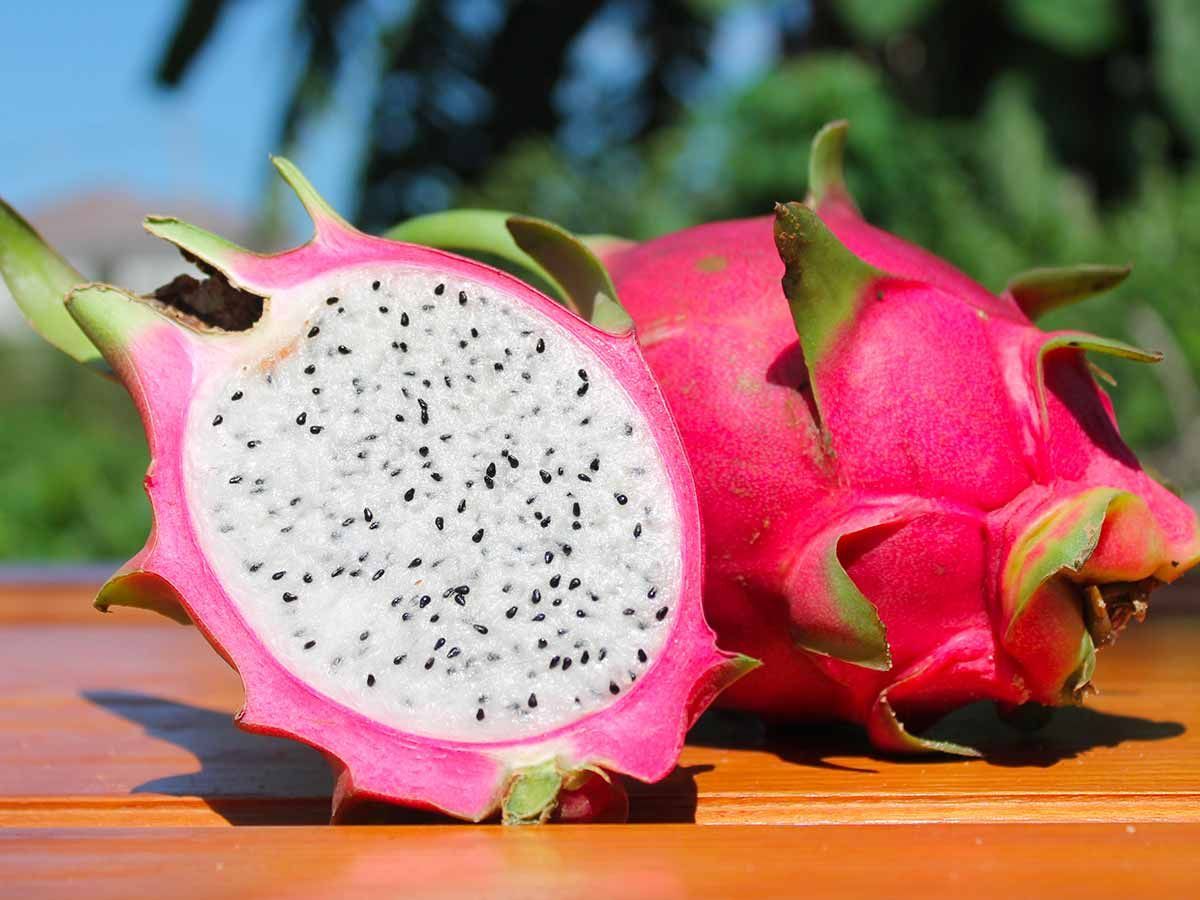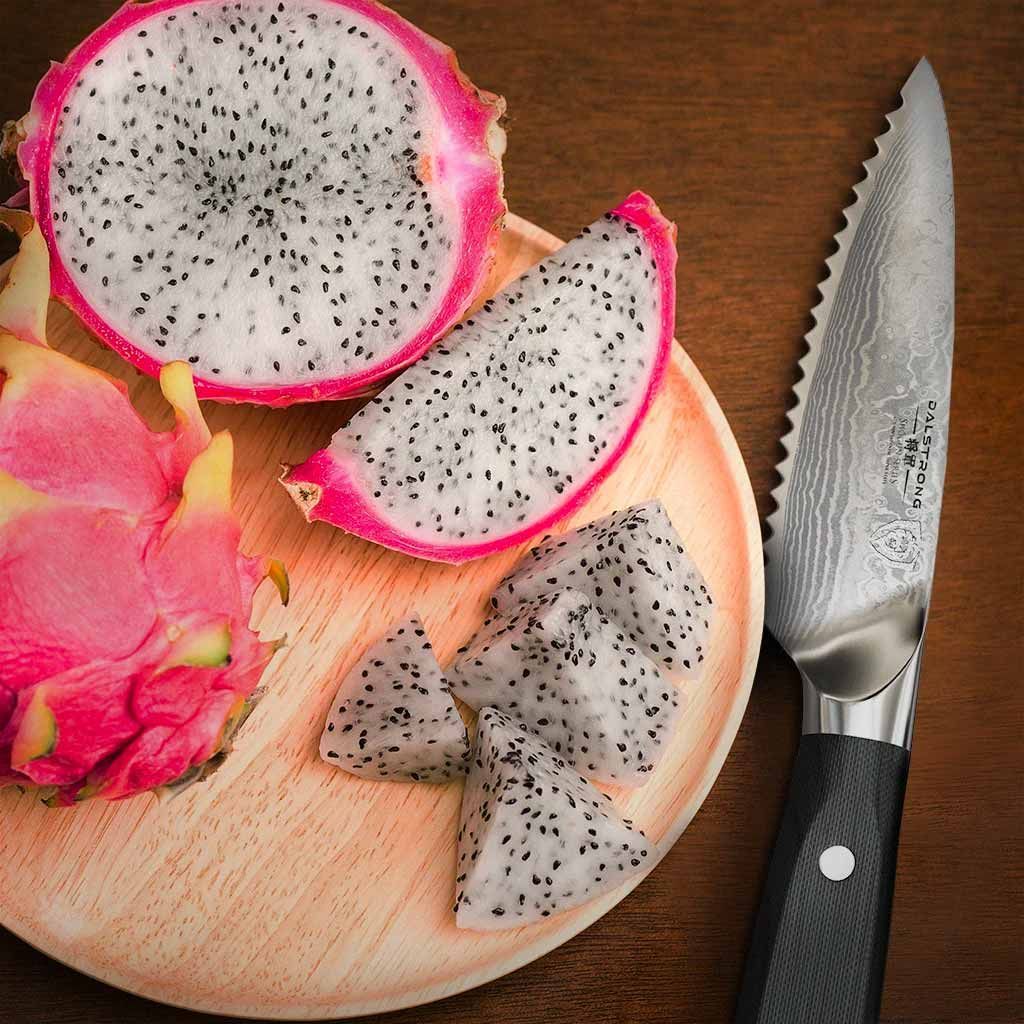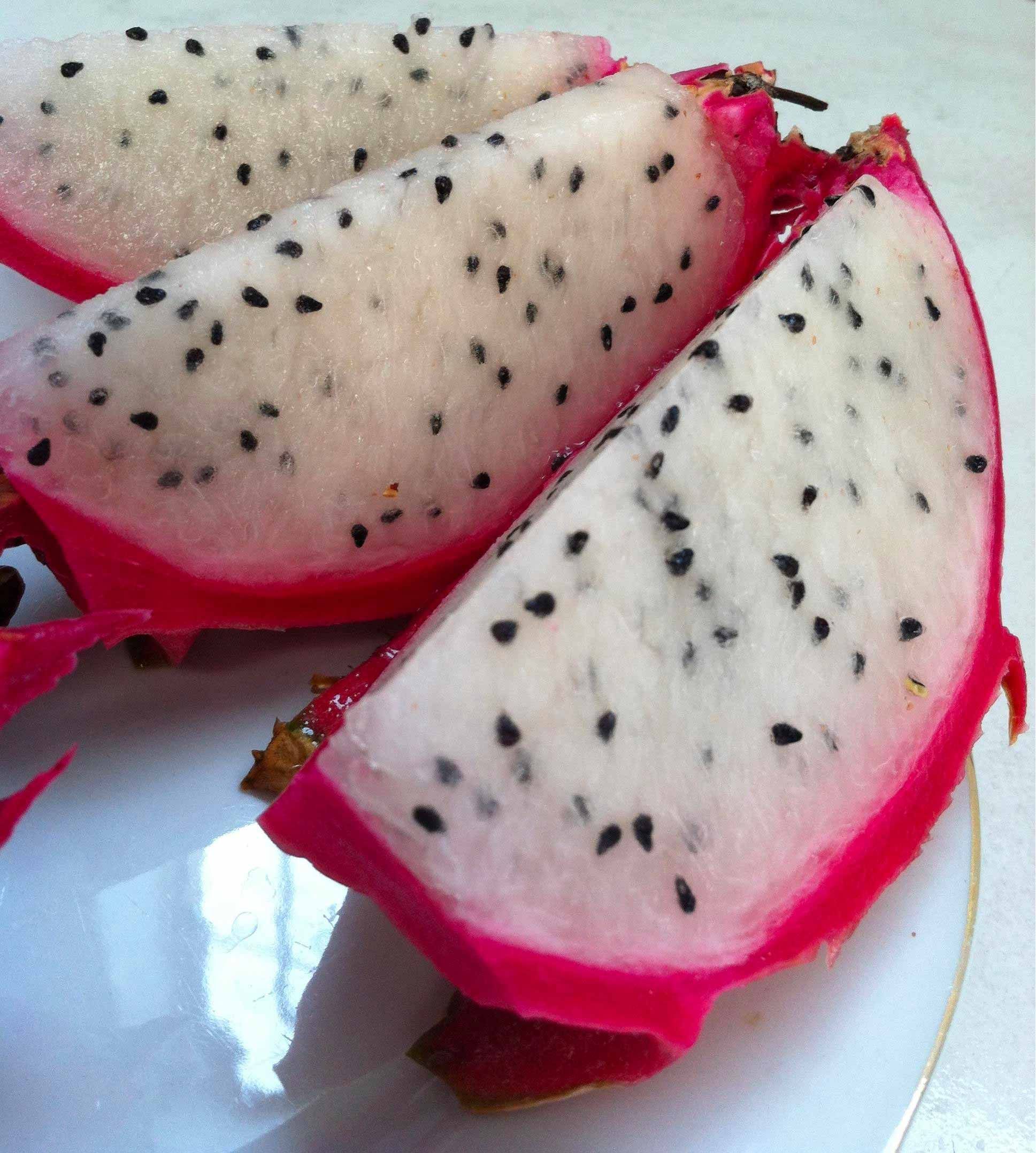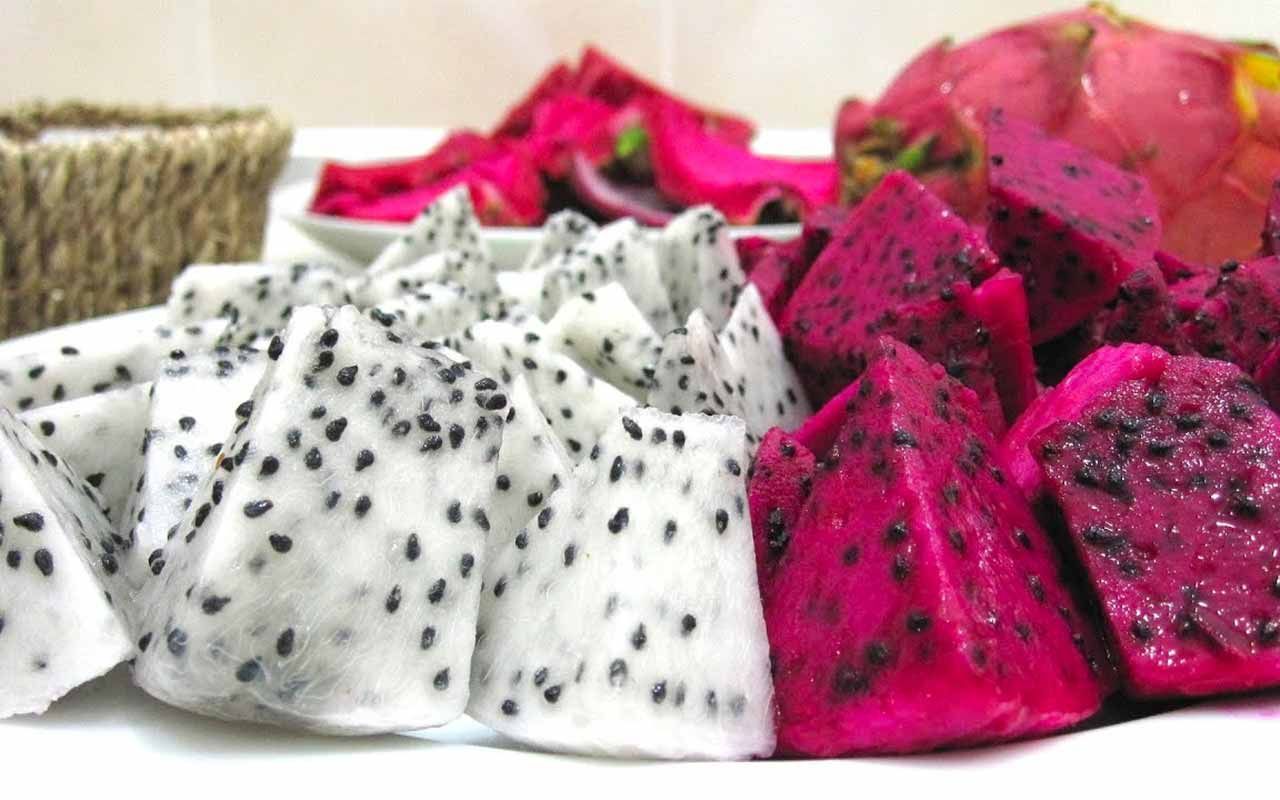Our recommendations are made independently. We may receive commissions from purchases made via our links.
How to Cut Dragon Fruit (in Three Different Styles) — Quick & Easy Cutting Guide
Just got your hands on a dragon fruit and wondering how to best cut it up? This guide can show you how to cut dragon fruit in only a few short minutes!
Though exotic and sometimes difficult to find, it tastes so good, you won’t regret spending time and effort learning how to cut dragon fruit.
The creamy, sugary flesh dotted with seeds is really versatile. For one, it makes for an excellent tropical snack and can be enjoyed as it is. You can also add pieces of it into different recipes, such as salads. The fruit won’t just improve the flavor, but also adds some aesthetic points to the dish with its exotic look. Juicing is also an option, with dragon fruit juice — just like its flesh — being quite high up on the nutritional scale as it’s loaded with vitamins and antioxidants.
With all of that possibilities in mind, here is all you should know about cutting dragon fruit.

How to Pick a Ripe Dragon Fruit
When you’re at the produce stand, you need to determine whether the dragon fruit has ripened or not. Like many other fruits, dragon fruit does not continue to ripen post-harvest.
If it’s still unripe and not yet ready to eat, you won’t be able to enjoy the full magic of the fruit. Unripe dragon fruit tastes very bland with a hint of sourness. In contrast, fully ripened dragon fruit tastes mildly sweet. Most people simply described it as pleasant.
Coloration
The most obvious sign is coloration. An unripe dragon fruit will be green. As the fruit begins to ripen, the skin’s color shifts into either a deep magenta or yellow, depending on the cultivar.

Look for dragon fruits that have a bright, evenly-colored skin all over. Avoid any that have skin with a lot of brown spots or bruises (a few spots or bruises are normal). That’s a sign of overripeness.
An overripe dragon fruit will also have brown spots splattered all over its inner flesh. The taste, while not exactly offensive, will still be ‘off’. It’s best to just avoid it altogether if you can.
The Shape of the ‘Wings’ and the Stem
Extending outward from the rotund body of the fruit are several pointy leaves. These are why dragon fruit got its awesome name as they resemble the wings of a dragon.
In an ideal dragon fruit, the tips of the wings should be withered and brown. They should NOT be green and healthy-looking. If the wings are still green, the fruit is underripe.

This is a very common mistake that a lot of people make while purchasing their dragon fruit.
Aside from the wings, you should also watch the stem of the fruit.
Interesting fact: the stem of a dragon fruit sprouts from the bottom, not the top. It is often a collection of several wings bunched up together, forming a reverse ‘crown’.
Unlike the wings, you will want a stem that is healthy and bright-looking. Avoid any fruit with a dried-out, brittle, or wilted stem. That’s a sign of overripeness.
Texture
While it is a great way to test the fruit’s ripeness, we don’t recommend you use this method while you’re out shopping. You should only test the fruit this way if you have grown the fruit yourself or you have permission from the shopkeeper.
Squeezing the fruit in your hands to feel its texture can leave a big dent in the fruit. It’s not the best thing to do to the shopkeeper or other customers.
In order to test the texture, pick up the dragon fruit and press against the tough skin with your thumbs. It should feel firm, but yielding. Your fingers should be able to make a visible dent on the fruit.
If the fruit feels rock solid in your hand, it hasn’t ripened just yet. And if the dragon fruit feels soft and mushy, it’s overripe.
The Best Ways to Cut Dragon Fruit
There is really only one way to cut the fruit. However, depending on how you want to present it, there are several ‘cutting styles’ you may go for: wedges, slices, or cubes.
How to Cut Dragon Fruit into Wedges
This style is the most straightforward and is highly recommended for beginners. Dragon fruit wedges are very versatile and can be used for snacking, adding to recipes, garnishing dishes, and more.

Step 1: Cut Off the Top and Bottom of the Fruit
With a sharp chef’s knife, make two crosswise cuts ½ inch down to remove the end pieces from the fruit’s body.
Step 2: Cut the Fruit in Half
Lay the fruit sideways on the cutting board. Make a single, lengthwise cut straight down the middle to cut the fruit in half. Start at the top of the fruit and go down to the stem at the bottom as it is easier that way.

If you’re not one for fancy presentations, you can take a spoon and dig straight in. No need to remove the skin. However, if aesthetic is more important to you, continue to the next step.
Step 3: Cut into Wedges
Lay both halves onto the chopping board with the exposed sides down for more convenient and stable cutting. With your knife, make evenly-spaced, crosswise cuts. The end result will be several easy-to-eat dragon fruit wedges.
When you want to snack on a wedge, just pick it up by the layer of skin at the bottom. Peel off a little bit of the skin on one end and eat up the sweet inner flesh as you go.

How to Cut Dragon Fruit into Slices
Step 1: Cut the Fruit in Half
Take off the top and the stem, then cut the fruit in half, as per instructions in the previous section.
Step 2: Take Off the Skin
Take a spoon and slot it at the very edge of one half;right where the flesh meets the thick outer skin. Apply pressure and drive the spoon down, slowly scooping the flesh from the skin.
Repeat with the second half.
Step 3: Trim Off Any Remaining Skin
Chances are the exposed dragon fruit flesh will still have a few pink-ish fibers from the skin still hanging on. You can trim them off with a knife or a spoon.
The skin is leathery and could be quite bitter. Any residue of it on the flesh could ruin the taste of a perfectly good slice of dragon fruit.
Step 4: Cut Into Slices
Put the ‘naked’ dragon fruit flesh flat side down. Make evenly-spaced crosswise cuts to separate it into thick slices.
This is basically the same as wedges, but without the skin.

How to Cut Dragon Fruit into Cubes
Cubes are perfect for garnishing salads or as an ingredient in a big fruit bowl. Fortunately, making them isn’t as difficult as it sounds.
Step 1: Cut the Fruit in Half and De-skin
As always, cut off the top and the stem, then slice the fruit in half before proceeding. Take off the skin like previously instructed, as well.
Step 2: Slice Up the Fruit
Before you can cut it into cubes, you have to make slices (the way to do this is directly above).
Step 3: Cut Into Cubes
Once you have the slices, lay each slice on its side on the chopping board.
Make a single cut lengthwise through the middle of the slice. Then, to create cubes, you only have to make evenly-spaced perpendicular crosswise cuts. The intersecting lines will form cubes.

Since the slices have a rounded section, you may have to do a bit of trimming if you want perfectly-formed cubes. Alternatively, snack on the rounded ones and add the fully-formed cubes to whatever you’re making!
Conclusion
Compared to many other fruits, cutting a dragon fruit is pretty straightforward. We’re confident that you will be able to nail it on your very first try.Hope you have found this guide on how to cut dragon fruit useful. Don’t hesitate to leave a comment below to share your experience with us after using these methods. We’d love to hear your story!





